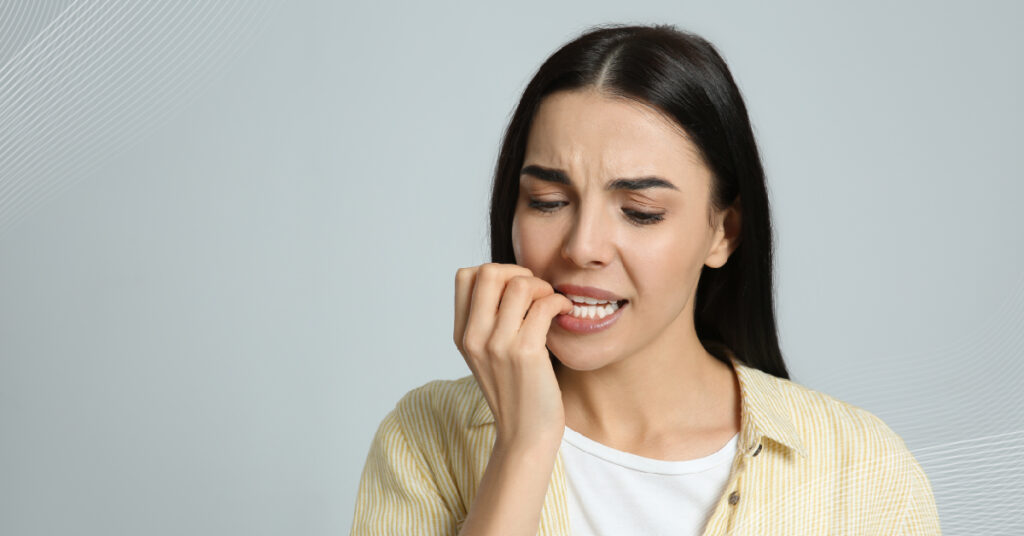
Ever wonder why your teeth might not be as healthy as they could be? You’re about to discover some game-changing advice that could transform your dental health routine for the better. Let’s explore the top tips to stop harmful dental habits that many of us unknowingly practice to help protect our smile!
If it’s not food, don’t bite it.
Your teeth are not tools – except for chewing food! Using them for anything else can lead to chips, cracks, and unnecessary wear. Here’s how to keep your teeth from doubling as hardware:
- Nail biting – This nervous habit can chip teeth and impact your jaw. Find stress-relieving alternatives like stress balls.
- Crunching ice – It’s natural and sugar-free, but it’s also hard enough to crack your teeth. Try chewing sugar-free gum instead when you’re craving that crunch.
- Using teeth as openers – It’s convenient to rip open a package with your teeth, but it’s risky. Keep scissors or a tool nearby to do the job without harming your smile.
Don’t floss without floss.
Improvising with anything other than floss for cleaning between teeth can harm your gums and leave you susceptible to infection. Stick to these safe practices:
- Avoid toothpicks and sharp objects – They can damage your gums and let in bacteria. Use gentle floss or a water flosser for safe cleaning.
- Gentle flossing – Don’t snap the floss into your gums. Guide it gently to avoid cuts and inflammation.
- Regular flossing – Make it a habit to floss at least once a day with proper floss to keep your gums healthy and prevent plaque buildup.
If you just ate, give your mouth a rest.
Brushing immediately after eating can sometimes do more harm than good. Here’s why waiting is wise:
- Acidic foods and beverages – After consuming acidic items, wait at least 30 minutes to brush. This helps protect your enamel.
- Rinse your mouth – If you can’t brush, rinse with water or a mouthwash to neutralize acids and help remove particles.
- Chew sugar-free gum- It stimulates saliva production, which naturally cleanses the mouth and helps neutralize acid.
Remember proper toothbrush maintenance.
A well-maintained toothbrush is essential for oral health. Here’s how to ensure your toothbrush is helping, not hindering, your dental care:
- Replace regularly – Change your toothbrush every 3-4 months or sooner if the bristles are frayed. A worn toothbrush won’t clean effectively.
- Keep it clean – Rinse your toothbrush thoroughly after each use and let it air dry. Don’t store it in a closed container where germs can thrive.
- Don’t share – Sharing a toothbrush can spread germs and infections. Make sure that every family member has their own, and store them separately.
Keep it to one fork per mouth, please.
Sharing utensils can spread more than just love – it can also spread germs. Here’s how to keep things sanitary:
- Use your own – Stick to using your own cups, straws, and silverware. It’s a simple step that greatly reduces the spread of germs.
- Clean well – Wash dishes and utensils thoroughly with hot, soapy water or in a dishwasher to kill any lingering bacteria.
- Be mindful of illness – If someone in the house is sick, use disposable items or ensure their utensils are washed separately.
By keeping these tips in mind, you’re not just avoiding harmful dental habits and potential dental problems; you’re investing in the long-term health of your family’s smiles. Let’s make these changes together and keep those pearly whites happy and healthy!
Sources:
“6 Habits That Harm Your Teeth (And How to Break Them),” American Dental Association, https://www.mouthhealthy.org/bad-habits-for-dental-health
“A dental expert weighs in on why you should never use a toothpick to clean your teeth,” Business Insider, https://www.businessinsider.com/guides/health/dental/are-toothpicks-bad-for-teeth-gums
“Is Brushing Teeth After Eating Good For You?” Colgate, https://www.colgate.com/en-ph/oral-health/brushing-and-flossing/is-brushing-teeth-after-eating-good-for-you“How Often Should You Change Your Toothbrush?” Colgate, https://www.colgate.com/en-in/oral-health/brushing-and-flossing/how-often-should-you-change-your-toothbrush-0114
